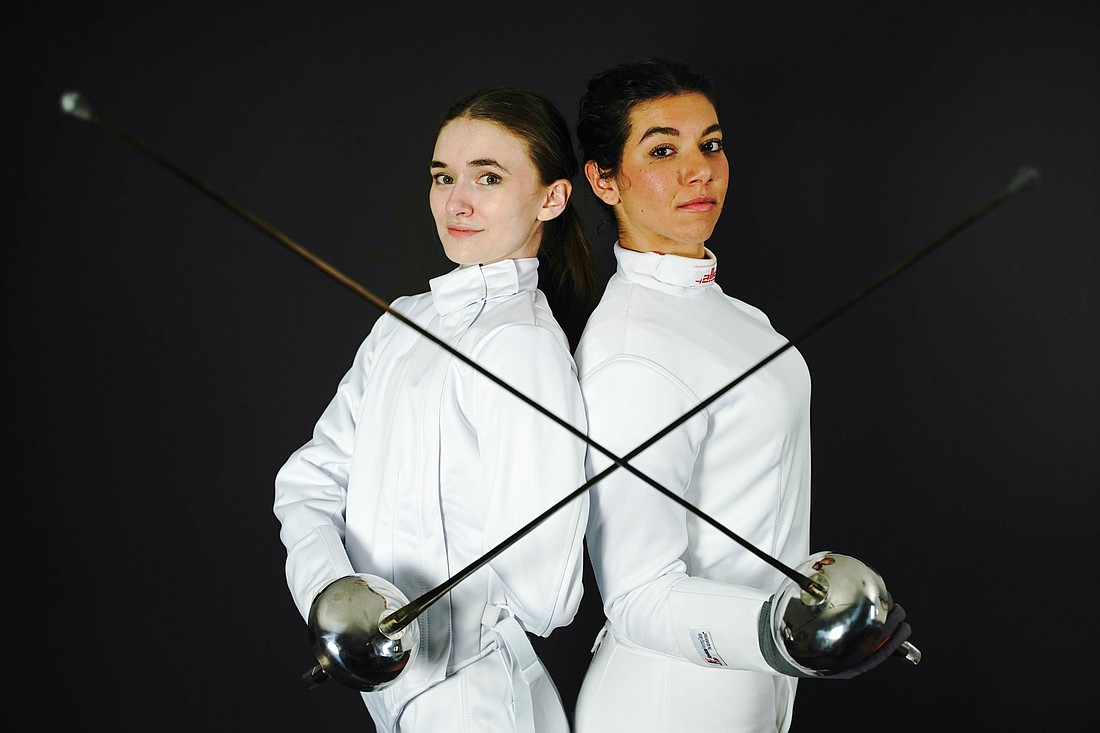- July 26, 2024
-
-
Loading

Loading

Gracie Gardner’s “Athena” has unsheathed its foils on the Urbanite Theatre stage.
It’s a play about fencing. But that’s a lot like saying “The Tempest” is a play about the aftermath of a shipwreck. There’s far more to it than that.
The setting is the Fencers’ Club in New York City. Two high school juniors are training for a national fencing competition. It’s their first bout together. And their backgrounds and fighting styles are radically different.
Athena (Lea Sevola) is aggressive and in your face. Whacking her foil on her opponent’s shoulder is her signature move. And when Athena scores, she shouts a warrior’s victory cry.
“Athena” is her self-chosen “fencing name” — a one-word handle like “Sting.” The character takes it from the Greek goddess — her role model. (As she puts it, Athena’s “just like the goddess of strategic warfare and all that.”)
But that Olympic grandiosity is missing from Athena’s home life. Outside of competition, she lives a life of quiet desperation, inhaling her father’s second-hand smoke in his cramped NYC apartment. Anything beyond community college is out of her reach. Winning the nationals is Athena’s way out.
Mary Wallace (Emma Giorgio) is shy and politely apologetic. When she loses a point, she weeps. Sure, she wants to win. But fencing’s just a hobby to her. Mary’s a child of privilege. (A rich kid, in other words.)
She needs no student loan. Marine biology? No problem. Mary’s family will happily pay her way. If she finds herself and changes her major, they’ll pay for that too. Mary needs no way out. She’s already in.
Class and temperament aside, these young women have something in common. They’re both good fencers — and they both want to get better. They’re almost evenly matched as training partners.
Despite their differences, they decide to keep training together.
And so they do.
Athena and Mary Wallace start off as sparring partners, not friends.
But as William Blake once observed, “Opposition is True Friendship.” By fighting each other, Mary and Athena make each other better. In the process, they become friends. But can they stay that way?
That would be telling.
And it’s hard to tell where this play is going.
Dialogue and swordplay go back and forth. Literally. That’s largely a result of the unconventional staging.
Live theater typically transpires behind a proscenium arch. That rectangular opening is an implied window — the invisible “fourth wall” through which you spy on the characters like a Peeping Tom with a ticket.
But “Athena” is far from typical.
The playwright’s highly specific about the staging she wants. Alyssa Mohn’s minimalistic set delivers beautifully.
In this Urbanite production, the characters fence (verbally and with foils) on a “piste” — a catwalk running from one end of the room to the other. The audience sits on both sides of this strip, watching the actors go back and forth. Here, you’re no voyeur gazing through a window. You’re in the room.
Now let’s shift from swords to words.
There’s a music to Gardner’s speech — a rhythmic, staccato counterpoint. In “Athena,” nobody rambles or monologues. Her dialogue is a series of short, sharp, shocks. Imagine a Pinter play about two female fencers …
Athena: I watch tapes.
Mary Wallace: I make notes.
Athena: I mentally catalogue my mistakes.
Mary Wallace: I fixate on mine.
Along with being sparse, Gardner’s speech is never on-the-nose. Her characters (like real-life teens) don’t wear their hearts on their sleeves. They don’t telegraph their deepest desires. (“I need a friend.” Or whatever.) Aside from psychobabble and sports clichés, they don’t put their motives into words. (And probably can’t.) You have to work that out for yourself.
There’s no fat in Gardner’s writing. Summer Dawn Wallace’s direction is equally lean-and-mean.
This scripted play strives to seem unscripted. Wallace succeeds in evoking the urgency of now. The two young actors do, too. They’re in the moment. And have no clue about the moments to come.
Kudos also to Katherine Coyl’s expert fight direction. Her swordplay doesn’t look choreographed. It obviously has to be. If not, the actors might get hurt. But if it’s not done well, their fights might seem fake.
Coyl always keeps it real. (Or seemingly real.)
Alison Gensmer’s costumes cleverly reveal and conceal. When they’re not suited up, Athena’s street garb is working-class tough; Mary Wallace’s outfits are tasteful and upscale. Gensmer’s clothes make the character — like wearable shorthand that individualizes them. But their fencing uniforms are just impersonal. They hide the fencers’ faces. Wire mesh masks are all you can see. It makes the actors look like serial killers from some grindhouse horror movie.
OK, that sounds pretty scary. But Gardner’s play is all about laughter, not slaughter. This is a comedy, folks. But a spoonful of comic sugar makes serious medicine go down. Between the laughs, the playwright hints of the characters’ hidden wounds …
Their story is deeply personal. But it also aims a spotlight on America’s obsession with winners and losers.
Sports is a zero-sum game. Most sports plays and movies are, too.
You want to know the final score! Rocky? Eric Liddell? Peter LaFleur? Who won?
In a typical sports play, that’s the big question. “Athena” doesn’t even ask it.
Gardner’s interested in a far different question …
Is William Blake right? Does fierce competition create friendship — or kill it?
The playwright’s ending gives her answer. I’m not sure I agree with it.
But I won’t give it away.